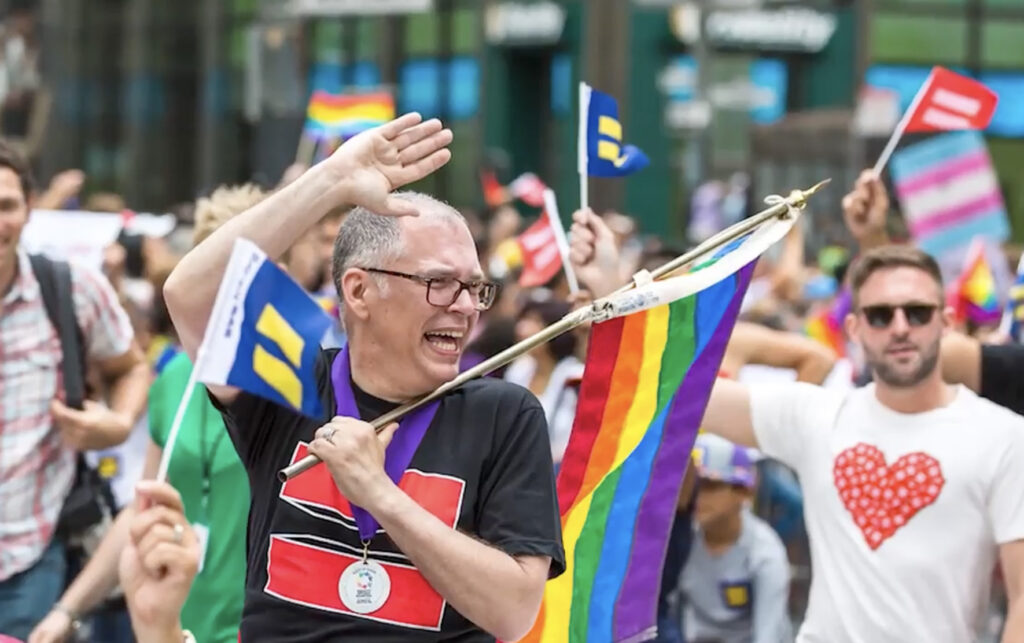Marriage equality pioneer Jim Obergefell’s next chapter
LGBTQ equality trailblazer and activist Jim Obergefell has begun a new journey and it might be his most important yet.
If the name sounds familiar that’s because Jim Obergefell, possibly one of America’s most unassuming and effective civil rights activists was the lead plaintiff in the 2015 U.S. Supreme Court case Obergefell v. Hodges, which contributed to the legalization of same-sex marriage throughout the United States. When I speak to Obergefell shortly after LGBTQ Victory Fund endorsed him as a candidate advancing to the November election after running unopposed in the Democratic primary for Ohio state House District 89, I thank him for doing something that changed my life and the lives of countless others.
Characteristically, Obergefell sees himself as part of a much broader movement consisting of many others, who at the time were fighting to bring “gay marriage” to all 50 U.S. states. But Obergefell, an Ohioan, had an urgent and personal need to fight that battle at home, where his state had banned same-sex marriage in 2004. The full story is available in his book (written with Debbie Cenziper), Love Wins: The Lovers and Lawyers Who Fought the Landmark Case for Marriage Equality. In the intensely moving prologue, we learn that in 2013, Obergefell’s partner of 20 years, John Arthur was dying of ALS. They wanted the right to say “I thee wed” before their ultimate parting. At great expense and effort they traveled to Maryland to get married, where it was legal. But in Ohio their marriage did not exist and once John died, it would be like their union had never existed either. And so Obergefell decided to launch the first-ever legal challenge to Ohio’s same-sex marriage ban.
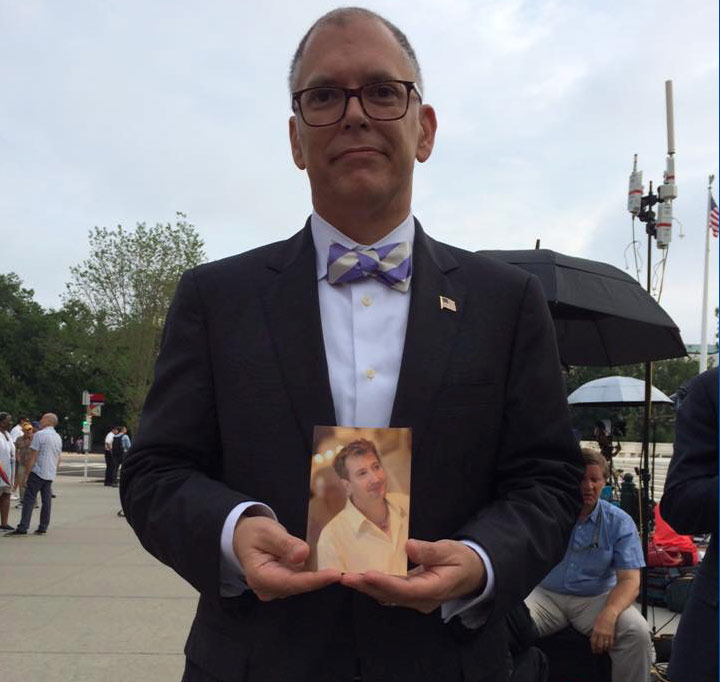
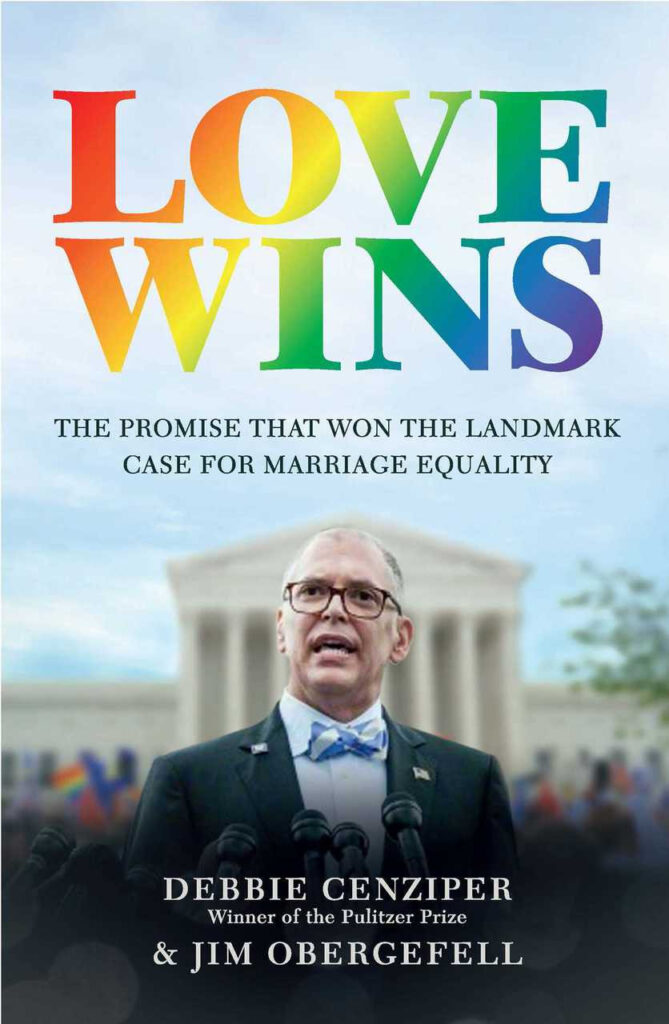
Today, this softly-spoken, modest man from Sandusky, is fighting once more on home ground, running for election to the Ohio House of Representatives at a time when the Right, emboldened by overturning Roe V. Wade, is determined to roll back other major civil rights — starting with marriage equality. Obergefell won his primary just weeks after the U.S. House of Representatives passed the Respect for Marriage Act to enshrine the Obergefell ruling into federal law. Annise Parker, President & CEO of LGBTQ Victory Fund, issued a statement praising Obergefell’s decision to rise to a new challenge, saying: “It is encouraging that his call to action for the LGBTQ community — that we must remain united in our shared fight for a more equitable future for the next generation of LGBTQ people — has been delivered on the campaign trail as a candidate himself. We are confident that come November, he will prove a skilled legislator with the political wherewithal to get meaningful reform done. His success is also a rallying cry to the LGBTQ community and our allies that we won’t stop organizing, we won’t stop running for office and we won’t back down.”


Obergefell added in a press statement: “When I win this election, I will work hard to improve the lives of the people in my district and across Ohio by increasing jobs and opportunities, improving access to affordable healthcare and protecting our environment. With so much at stake for our nation, I will also be a voice and advocate for all Ohioans and especially underserved and marginalized communities.”
Queer Forty caught up with Obergefell to get his thoughts on the current political climate, which is increasingly hostile to the LGBTQ community just seven years after the passage of marriage equality; and what this new chapter in his life means to him and us.
Q40: Jim, from activist to — hopefully — elected official: Can you bring us up to speed to where you are right now?
Jim Obergefell: This year is a big change for me. This year was a decision to run for office. And, you know, I really have to say that I would have never considered this. I would have never made that decision if it weren’t for my experience with the marriage equality fight and just living firsthand what it means to actually be part of making things better and fighting for the things that actually matter. That experience really did change me profoundly. And back in 2015, openly gay Pennsylvania State Representative Brian Sims, he sat me down the day I met him and said “Some people are going to start mentioning public service. Do me a favor and don’t just say no, at least think about it.” And he was right. People started asking me, “Jim, when are you running for office, we would vote for you.”
It was in the back of my mind, so I was living in Columbus, Ohio, when the pandemic hit. And spending the first year of that, living by myself in my apartment, made me rethink what mattered and what was important. … But I realized that with John being gone — my family that I’d lived with no matter where I lived — was gone. The pandemic helped me realize what I wanted was to be home with my family. So I moved home [to Sandusky]. Everything just came together like, this is the right time, the right place to do this.
Our community was moving forward, thanks to activists like you, but it seems now to be in a much more precarious position than it was eight years ago. What is your view?
Obergefell: That is my feeling. Certain justices on the Supreme Court have been pretty open about their distaste for marriage equality. But then to have a justice point blank say “we need to rethink this” — yeah, it’s scary. So that, and also bringing up And Lawrence v. Texas, which would reinstate the ability to once again criminalize intimate relations in the privacy of your own home; and the continued terrible attacks on the transgender community.; and the Don’t Say Gay bill. I feel like our community is in a much more precarious position than seven years ago.
It honestly stunned me that it’s only been seven years since marriage equality. And we’re already now talking about how we feel it’s at risk.
So I can’t say that all of that is really what drove me to decide to run for office, but it certainly played into it because I just feel this need to keep fighting, to do what’s right, and to make life better.
The decision to run for office in your fifties, with already a substantial history of community activism behind you, is it energizing you?
Obergefell: It definitely energizes me because I know it’s the right thing for me to do right now. But it’s also tiring, it’s overwhelming and it’s scary. But it isn’t like I haven’t been through things like that before. I don’t feel like it’s made huge changes or made me approach life incredibly differently. But I’m out and about even more now, especially in my hometown, I’m more in the public eye. So I’m aware of that. I spoke at the first Pride in Bowling Green, Ohio, this past weekend, I spoke in Fremont, Ohio earlier this year. I’m even more in the public eye, especially in Ohio. I do find myself wondering, could something unpleasant happen? I have to admit back during the case, I really didn’t worry about that. It wasn’t how I approach life. I was me. But now I do find myself thinking about it more frequently. And I should be having it on my mind sometimes.
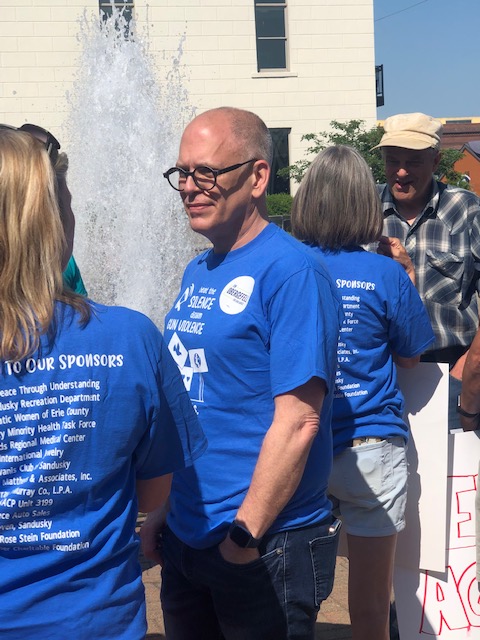
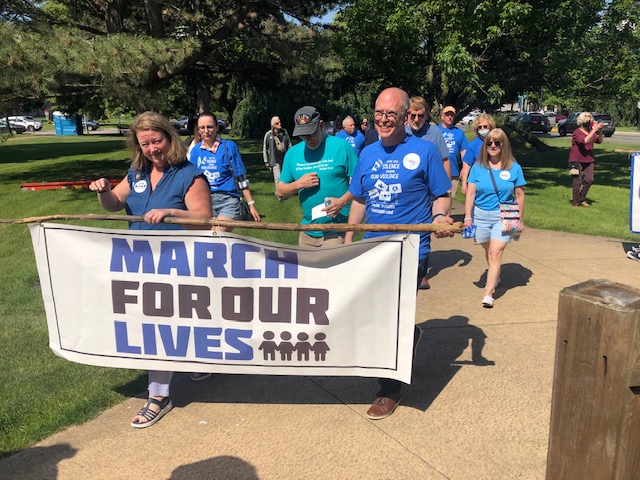
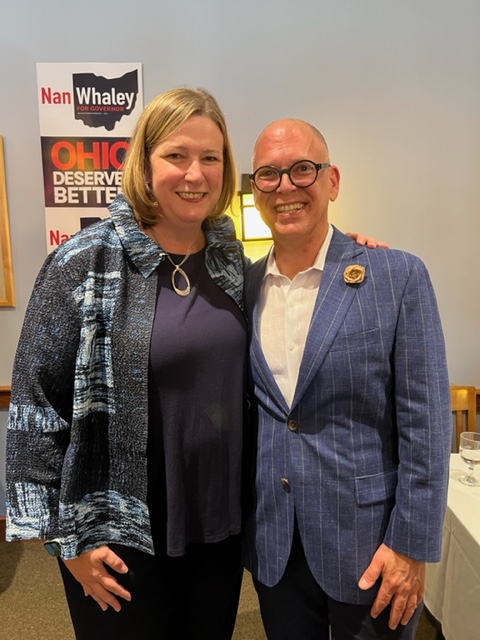
If you want to change the order of things what else is there to do? You can’t sit back and do nothing.
Obergefell: Correct! I think about this young woman who told me earlier this year that if it weren’t for Obergefell v. Hodges, she would have committed suicide. And I think about all the young people I’ve met who have come out to me and have told me what marriage equality means to them, and how it’s helped them. That’s much more important to me than anything. I think about this this young man who after Amy Coney Barrett was nominated and he was 12 years old at the time in the car with his mom. And they were listening to NPR and he just started crying in the car. He said, “Mom, am I going to lose the right to marry before I even have found someone to love?” So it’s things like that just keep me going — that and the queer community. We are the most intersectional community there is. Everything that other people worry about, we worry about too: We worry about jobs, health care. This is my way to keep fighting for others and to just make things better.
This year is the most diverse crop of political candidates from our community, according to Victory Fund. I’m wondering how you feel as a white guy, which sometimes is painted as the worst thing you can be. How intersectional is your mindset is intersectional?
Obergefell: You know, that’s one of the things I say every time I speak in front of a queer audience or an audience that includes majority queer people. And I also say in front of everyone else. I talk about how as a white, cisgender gay man, I have no right asking for my rights or my equality if I’m not asking for that for every other marginalized community. That’s been a consistent message of mine for years now. I can’t fight just for me and people who look like me. If I truly am about marriage equality, if I’m about equality and I’m about equality for everyone who is marginalized. And when I’m in front of the queer community, I always say, I can’t just I can’t fight for the G and LGBTQ. I’m out there fighting for or speaking on behalf of every other person in our community.
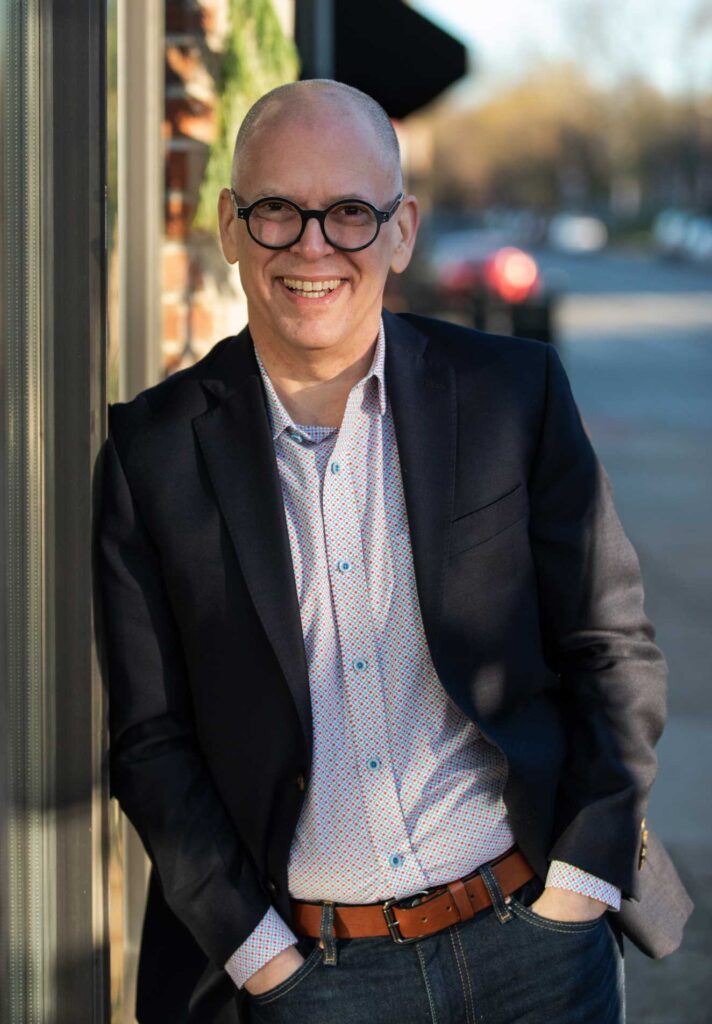
What has growing up in Ohio given you? Given that you have had to fight to bring LGBTQ Ohioans and others equal rights.
Obergefell: Sandusky, my hometown, has had Pride now for five years and I just love it, to me that’s one of the things that really exemplifies the progress we’ve made and also why I’m so terrified by the potential loss. When I was growing up, from K through 12th grade, my classrooms were easily minimum 30% Black. And I really love that I grew up that way, that I grew up seeing people who were different than me, even though as a kid I didn’t see it because they were just my friends. They were the kids in my class, they were my neighbors. And that’s one of the things that I really am most grateful for about growing up in Sandusky is that I grew up in a more diverse place than a lot of other areas in Ohio. And I also credit my parents for teaching me their values of treating people well and doing what’s right. I just credit my family and I think my community, I have a moral sense, a moral center. So I think that’s one of the things that I can credit my upbringing with.
On a personal note, obviously you suffered a huge personal loss when your husband John died. Where are you now in your romantic life? Are you dating?
Obergefell: I want to. And, you know, I also credit John. A big part of that is John because in his last year of life, people would come over and stay with him to give me a break so I could just go out to dinner or whatever, and every time I would come home so they could leave, they said, “Jim, John told us to remind you that after he’s gone, he wants you to find love again.” So, I want to fall in love again. I thought I had found it, but that didn’t quite work out. I haven’t dated much at all. I don’t feel I know how to date. And I’m not an app person [laughs], that isn’t who I am. And I’m not someone who’s out there, you know, just for hookups. Given who I am makes dating apps even worse for me because people recognize me. Not that that’s a bad thing, but I don’t want someone to show interest just because, oh, it’s Jim Obergefell. I want that electric spark of seeing someone and your eyes meeting.
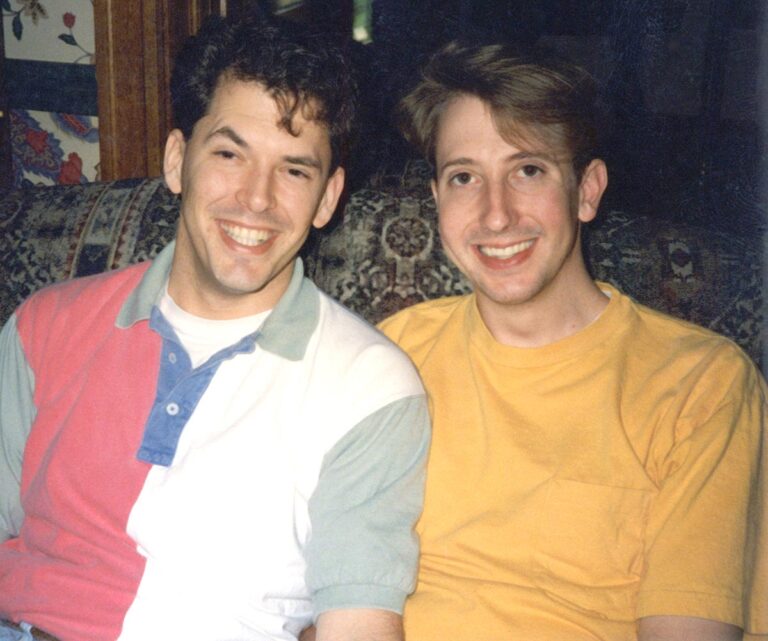
You’re out there, in circulation, making a difference, changing people’s lives. That energy will come back to you.
Obergefell: I hope so. Because I sure miss John. I miss having that person that no matter what happens, whether it’s something good, something bad — having that first person you call, the first person you text. I miss that.
One of the problems with getting older is dealing with loss. And we in our community tell young people It Gets Better. And that’s not necessarily so. They see the pandemic, the war in Ukraine, inflation, climate change, and the loss of equal rights and they’re like, how does it get better? Any words of advice to them? And to any of us who need the courage to keep going.
Obergefell: I would say don’t give up hope. Right now I understand people feeling hopeless, people feeling like things are just going terribly wrong and there’s no reason to feel hope. But there are so many people out there who are fighting to make things better, people who have dedicated their lives to improving things and to helping others. So you’re not alone. I know it feels that way and it’s how I feel at times, too. It’s okay to feel that way. But there are so many people out there who are dedicated to doing things that will make a positive change. And I know it can feel like it’s never going to happen. You’re never going to see it. Well, I never thought I would be able to say “I do” to John. I never thought I could use the word “husband” and have it mean anything and yet that happened. But it happened because people were fighting, people were out there working to make things better.
So I really focus on the fact that there are just so many people out there who are dedicated to improving things for everyone else. And I know it’s not easy. But there’s somebody out there who will love you, accept you. There are a lot of people out there who will love you, accept you and can make your corner of the world better.
Get behind Jim Obergefell’s run for office here.

